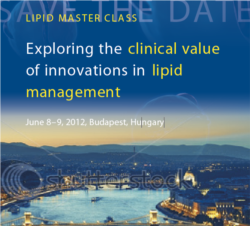Exploring the clinical value of innovations in lipid management
01/10/2012
held on September 21-22, 2012, Budapest, Hungary
Lipid Innovations Master ClassNews - Oct. 1, 2012
Educational objectives of this Master Class are:
- To explore the mechanisms underlying the complex interplay between the clinical benefit of (combined) lipid modulation and baseline serum lipid levels.
- To review new data on effective lipid lowering and its relevance to treatment strategies and outcomes
- To review the clinical significance of additional lipid lowering pathways in the management of atherosclerosis
- To evaluate the effects of new HDL-C raising therapies on the risk of cardiovascular events in CV risk patients
- To understand the medical need for aggressive lipid management in patients at high CV risk, such as DM and metabolic syndrome
- To develop a consensus on practical guidelines for day-to-day lipid management of patients with atherosclerosis and CV risk
Preliminary Agenda
Meeting Chairmen
- John J P Kastelein,MD, Professor of Medicine, Academic Medical Centre, Amsterdam, The Netherlands
- John Betteridge, MD, Emeritus Professor of Endocrinology & Metabolism, University College London, United Kingdom
18:00 - 20:45
New concepts and guidelines in the management of LDL-c and CV Risk: Need for early intervention
Prof. Ulf Landmesser, MD
University Hospital Zurich,
Switzerland
Latest insights from clinical trials: The unassailable case for LDL-c lowering
Prof. Kausik Ray, MD
George’s Hospital NHS Trust
London, United Kingdom
Residual risk and HDL-cholesterol: What are the current perspectives in management?
Prof. Erik Stroes, MD
Academic Medical Centre
Amsterdam, The Netherlands
Saturday, September 22
08:30 - 14:00
Lipid management in clinical practice: Need for improvement?
Prof Richard Hobbs, MD
University of Oxford, United Kingdom
The importance of lipid lowering through liver and intestine: An overview of all relevant data for atherosclerosis
Prof. Alberto Corsini, PhD
University of Milan, Milan, Italy
Lipid management in the diabetic patient What are the therapeutic options?
Prof. John Betteridge, MD
University College London, United Kingdom
Protecting the heart and the kidney: Implications from the SHARP trial
Christina Reith, MD
University of Oxford, United Kingdom
Novel therapies for the prevention of atherosclerotic vascular disease
Prof John Kastelein, MD
Academic Medical Centre, Amsterdam, The Netherlands
Workshops sessions- Meet the expert: Defining take home messages
CME accreditation
The Scientific programme is developed under the auspices of the Physicians’ Academy for Cardiovascular Education(PACE) Foundation and supervised by the University College London. This PACE Lipid Master Class is accredited by
the European Board for Accreditation in Cardiology (EBAC) for 6 CME credit hours (Day #1: 2 CME credits - Day #2: 4
CME credits). Each participant should claim only those hours of credit that have actually been spent in the educational
activity. EBAC works according to the quality standards of the European Accreditation Council for Continuing Medical
Education (EACCME), which is an institution of the European Union of Medical Specialists (UEMS).
Who should attend
Participants to this Master Class are medical specialists; cardiologists, internists, endocrinologists with a particular interest in lipid management in patients in patients with increased risk. The attendance is limited to ensure lively interaction and discussion.
Meeting venue
Hilton Hotel, Budapest, HungaryRegistration
- Individual registration: The individual non sponsored registration fee is € 1.250, including hotel accomodation for 1 night
Go here for to continue for registration
- Sponsored delegates: If your participation is sponsored by a third party. Please click here to continue for registration. Please note that confirmation by sponsor is required
- Group sponsored registration: For group registration please contact the PACE Foundation via MEDCON International to obtain trhe required registration documents. Continue here for group registrations
Funding
This conference is supported through an unrestricted educational grant provided by MSD

